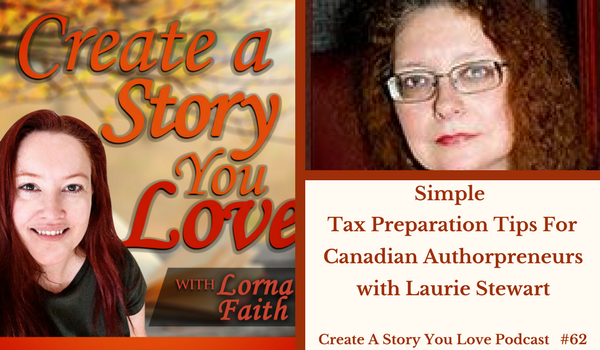If you struggle with preparing your yearly taxes as an author, listen in to Laurie’s tips in today’s interview. Laurie Stewart is a fantasy and multi-genre indie author who spent quite a few years at the CRA – before becoming an author – learning tax and filing procedures. She shares with us her tips in this interview.
Even though Laurie does talk more specifically about filing tax forms she’s familiar with – Canadian taxes – many of her tips and ideas will help authors from anywhere to organize and simplify their filing process.

In the intro, I share some books I’ve been reading that have helped me and maybe one of two of them will help you too in your author journey:
1.First book mentioned is Laurie Stewart’s book to help simply your tax prep process: The Canadian Authorpreneur’s Tax Journal: 2017 Tax Year.
2. A series of books for writers that has inspired me is a recent series by Patty Jansen titled: Self-Publishing UnBoxed; Mailing Lists Unboxed; Going Wide Unboxed. Each book has the subtitle: The 3 Year, No bestseller plan for making a sustainable living from your writing. Each of these books are very encouraging for writers and I feel they inspire you to stick with it – even on days when you don’t feel like it’s going so well in your author business.
Watch the Video Interview
 Laurie Stewart, writes multi-genre fiction, nonfiction and paints on her hobby farm just outside Ottawa, Canada. She also creates delicious food for her husband from which she has written and released two cookbooks with many more planned 🙂
Laurie Stewart, writes multi-genre fiction, nonfiction and paints on her hobby farm just outside Ottawa, Canada. She also creates delicious food for her husband from which she has written and released two cookbooks with many more planned 🙂
Fiction books include: the Mechanicsville series, a gritty YA story about 3 inner city kids dealing with issues beyond their experience and maturity. Her epic fantasy, Terreagles series in in progress. The first story in the series, The Last Shot, won first place in the Radish app competition, fantasy division. Her dark urban fantasy series set in modern day Ottawa, includes Shifting Shards and December Wishes, published by Eighth Ripple Press. Other planned books are the Avalon series based on Arthurian legends and the Smith Falls ghost cozy mystery series. Non-Fiction books include: 2 Cookbooks and a book to help writers with simple tips to prepare their taxes: The Canadian Authorpreneur’s Tax Journal: 2017 Tax Year.
Most of this interview was focussed on tax preparation
Pros and Cons between a Sole Proprietorship vs. Corporation

Sole Proprietorship: This is business owned and run by one person with no legal distinction between the owner and the business entity. When filing for a sole proprietorship you can claim it on your regular T1 tax return. Use the tax form T2125 to calculate costs of expenses and revenue for your sole proprietorship.
Benefits: You can deduct your losses from your day job’s income. For example: If you make 60,000, but lost 10,000 because you had to buy a computer and pay for editing, book covers, or other losses, you can take that 10,000 worth of losses off of your 60,000 income from your day job, thereby saving you money on taxes.
Corporation: When you incorporate your business, it is considered to be a legal entity that is separate from you as a individual. Laurie recommends always setting up your author business as a corporation. (If you’re a Canadian author you can go to Industry Canada’s website and go through and answer the questions to set up your corporation for $200).
Benefits: When you incorporate your author business it separates you from your work. For example: if you write a murder mystery that is about a woman lawyer who is by day a lawyer and by night a prostitute, and the name you gave this female lawyer was actually the name of a lawyer in real life – that lawyer could sue you. If you are a sole proprietor she can sue you personally and take your house or car, etc. But if you setup your author business as a corporation, she can only take those items that are part of your corporation like your used computer, your desk, etc. She can’t touch your income from your job, your house or your car.
Recommendations: Laurie encourages authors to setup their author business as a corporation because it gives you that extra layer of protection and there are more write-offs as a corporation than there are for you as a sole proprietorship.
Laurie’s Tips for First-Time Authors to Structure your Corporation:
If you’re just starting out as a writer and you want to setup your business from the start as a corporation, then here’s some recommended steps to begin:
1.First, go to Industry Canada and click Incorporate.
2.Next, the following are recommended items to click as you follow the Industry Canada website to incorporate: a)Privately owned corporation; b) Fewer than 50 shareholders c)Non-distributing d) Annual General Meeting(if it’s only you) December 31st.
If you’re interested, check out the Canadian Author’s Association which offers: workshops on writing; video access to all workshops if you don’t live nearby; Medical insurance(dental, eyeglasses, etc.).
Other details to remember when incorporating:
1.The yearly fee of $20 to Industry Canada to keep your corporation searchable.
2.Register for your HST(if you have HST in your Province) and GST number as a Corporation.
3.You need to fill out and send tax forms T1(personal tax form) and T2 as a Corporation.
Find out what new books Laurie’s working on, at her author website at LaurieStewart-author.com. Also, you can connect with her on Twitter or Facebook.

